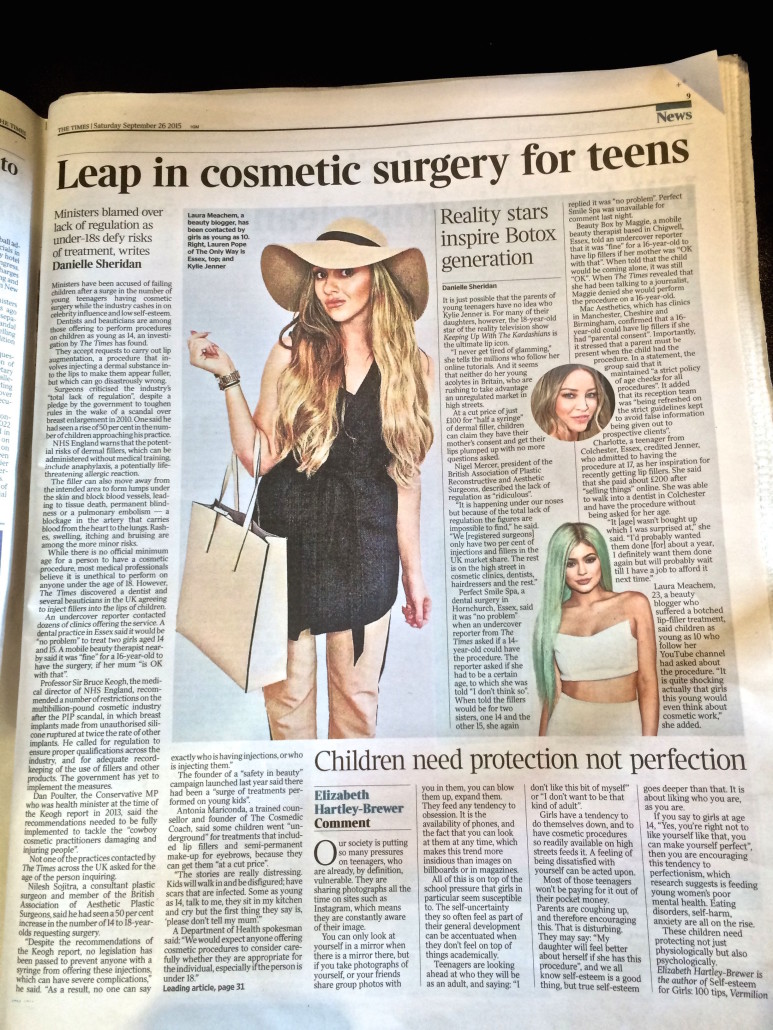By JONATHAN FINE
Leap in cosmetic surgery for teens was the headline on page 9 of The Times last Saturday.
Reporter Danielle Sheridan said girls were at risk of anaphylaxis, tissue death, permanent blindness and pulmonary embolism from dodgy lip augmentation procedures.
Unscrupulous beauty therapists in high street salons and dental clinics were botching lip fillers because they had no medical training, and required none, and they were accepting clients as young as 14.
Like you, no doubt, I was horrified. And like you, my nose was put slightly out of joint by the clear message of this story, that dentists are endangering young girls. In my view it’s the other way round; I’ve dealt with well over 100 practices myself, helping many to introduce facial aesthetics, and my experience is that dental practices in the UK are the safest places to get lip fillers done. It’s not rocket science: dentists are trained doctors who specialise on the face and do facial injections for a living. They are bound to be the best at pretty much all facial aesthetics bar the most specialised surgical work. And to boot they tend to be – massive generalisation here – conservative in nature and cautious, certainly not mavericks.
So why are dentists being portrayed as wicked money grabbers who trample over the wellbeing of teenage girls to fill their surgeries? Simple: a few bad apples. Everyone knows places like the one mentioned by the reporter Ms Sheridan in Essex that accepts under-18s for facial aesthetics treatments.
Unethical clinics aren’t representative of UK dentistry, and they aren’t new. They’ve been cashing in by flogging the latest trends in cosmetic dentistry for years; first it was veneers, then teeth in a day, then invisible braces. Now it’s facial aesthetics. All ethical in the right hands.
Greedy practices do things that are good for them but not their patients, like recommending veneers where tooth damage outweighs the cosmetic benefits, or implants where there’s an unacceptable chance of failure. They do what they can get away with, and it’s no surprise to learn they sell lip fillers to 14-year-olds because there isn’t a law against this yet.
This kind of behaviour is why patients tend to worry about accepting treatment plans from any practice, especially with complex cases. It’s why they hesitate. And you can’t blame them.
So, with some urgency, here’s how to distance your practice from unethical behaviour in facial aesthetics:
- Check your branding. Does it identify your practice as a business that behaves ethically? Silence on this won’t wash – you need to acknowledge there is malpractice and mistrust, and position your practice as a safe, ethical provider. This doesn’t mean you need a rebrand – you can tweak straplines and copy on your website, and tweak the content on your blog and social media to reflect your position on this issue.
- Promote your USP: clinical excellence. Play to your strengths. You’d be surprised how many extremely advanced dental clinics we work with undersell themselves by jumping on the cosmetics bandwagon and copy what they’ve seen the local beauty salon do. As dentists are quite new to this it’s understandable, but it’s time to tighten things up by making your USP (unique selling point) the top line. Take a look at your website and marketing collateral. Have you ended up with the same old airbrushed images and generic copy? Make it realer, more sober. Have you omitted to explain why all facial aesthetics procedures at your practice are performed by medically qualified staff in hospital grade facilities? And why dentists are naturally the safest, most skilled facial aesthetics practitioners it is possible to find?
- Publish guidelines on age restrictions. Go one further than simply saying your facial aesthetics treatments are not available to under-18s, explain that as an ethical business you are worried about the surge in self-harming, bullying and suicide among female minors, linked to online scrutiny of their appearance on apps likes Instagram, which untrained beauty therapists, along with a new generation of vloggers and any number of make-up and “health food” companies are exploiting.
- Do the facial aesthetics yourself. It’s common for dental practices to feel a bit uncomfortable about this new offering, and many treat it as a separate part of their business, their approach being something like, “Let’s get someone in to cover this stuff, which we apparently need to do to stay competitive.” Do the training yourself and treat it as an important part of a responsible, integrated facial care service.
Get in touch with me if you need help separating your business from the bad apples.
Best
JJF
jonathan.fine@breathebusiness.co.uk
07860 672727

